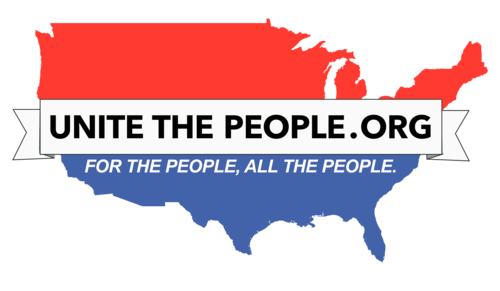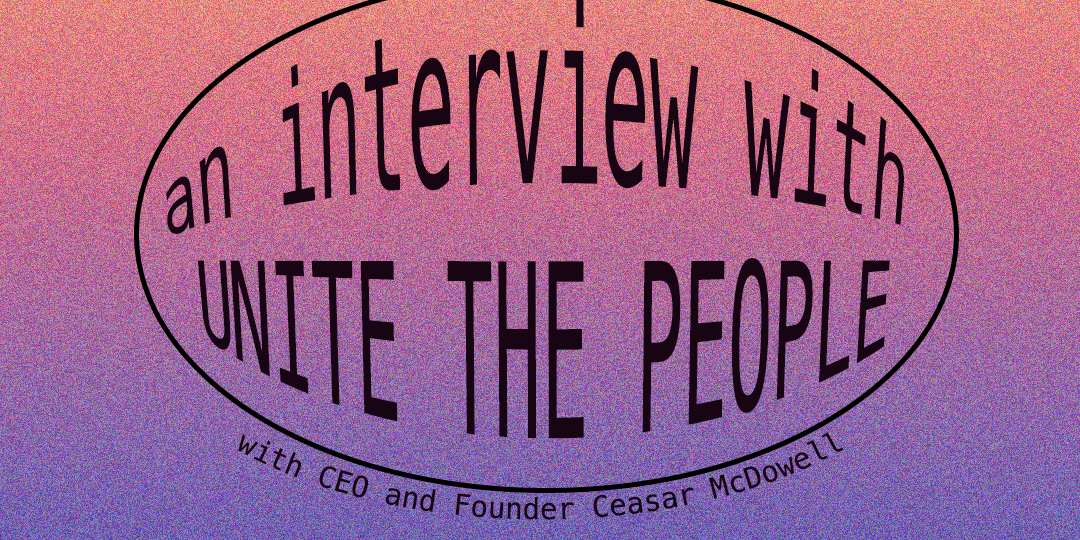Listen to this interview on Spotify and Apple Podcasts.

“Unite the People here, how can I help you?”
14 years into his prison sentence — three life sentences for a non-violent crime — Ceasar McDowell founded Unite the People, a non-profit organization providing legal services for low-income communities in California, right from his cell at San Quentin State Prison.
By working with his brother on the outside, he built a website, filed paperwork, and took company calls on a contraband cell-phone
The very first month Unite the People was up and running, they received between 70,000 and 80,000 emails from families asking for help.
Now, Unite the People is a thriving team of lawyers, activists, concerned citizens, and system-impacted family and friends who understand the reality of mass incarceration and the need for a change.
Last month, I sat down with Ceasar to talk about his story — his journey, motivations, inspiration, and Unite the People’s future. Here are some highlights of our conversation. Be sure to listen to the full interview linked above.
On how it all began
Ceasar McDowell: While I was incarcerated, one thing that I saw a lot of was guys that just couldn’t afford good legal representation. My story is not one story. There’s thousands of men like me. What seemed to be the recurring theme was that these guys cannot afford good legal representation. They have a public defender, you know, but that public defender may have 300-350 cases going on at the same time, they don’t have time to stop and represent each person the way they should.
I contacted my brother one time, you get tired of seeing the police killing the black and brown kids in the streets for no reason and then getting off and nobody can do anything about it. We might ride and rally in the streets, but nobody’s holding these police accountable. Nobody’s pressuring the DAs to hold these people accountable. Right? I just wanted to do something about it.
We may not have the money, we may not have the political power, but what we do have is we have the numbers.
Everybody always says, ‘somebody needs to do something about this’. But nobody ever says, ‘I’m going to do something about this’. We may not have the money, we may not have the political power, but what we do have is we have the numbers. And if the people ever are serious about something, and come together, and unite, for whatever the reason may be, then that’s how you get things done. Hence the name, Unite the People.
On Unite the People’s formation
Ceasar: [I was] right under death row. I’m where Scott Peterson is, the night stalker, all these guys are there at the same time I’m there. I’m there for a non-violent crime, for cussing in my living room.
I had a cell phone. I filed our articles of incorporation from my prison cell at San Quentin State Prison. I built our first WordPress website on the cell. As soon as we started the organization, like literally, within a couple months, Prop 57 passed. It was a prison reform where people with nonviolent crimes that had gotten life sentences like myself, had a chance to go in front of the board to go home. The governor put in that bill that the prison has discretion so they don’t release any violent people, they have the discretion to release who they want, thinking that the prison system would follow the rules, the law, and talk to guys like me, that had these non-violent crimes. The prison system came up and said ‘Hey, look, he gave us discretion, we’re not releasing anyone’. And they didn’t release nobody for years.
I had a cell phone. I filed our articles of incorporation from my prison cell at San Quentin State Prison. I built our first WordPress website on the cell.
That just so happened to be right when we started this organization. We got emails from families like, ‘hey, can you help us’ whether it’s immigration, whether it’s guys that are in prison and they just told them that even though this law passed, they’re not gonna do anything about it.
My brother and I, we hired lawyers, but we wouldn’t hire just any lawyer. They had to be advocate lawyers, you have already done work for the people. And we knew that you cared about people. And we don’t hire any staff members here that don’t have loved ones that have either been formerly incarcerated, or been deported.
On struggles, challenges, and hard times
Ceasar: I couldn’t tell people I was in prison. Nobody knew about me. Everybody only knew about my brother. If you go back and look at Google, at articles, no one mentions Ceasar from years ago. They only know about Mitch.
I used to wake up in the morning. Breakfast at San Quentin Prison is about 6 am. I’d wake up, go have breakfast, come back. You can’t tell right now, but I used to work out every day after breakfast for about an hour. From 7:30 in the morning, until 1:30 the next morning, I was doing something to further the organization. I saw a dream.
I tell people this too. This is not me. This is God’s engineering, I promise you. But this is a nonprofit. Nonprofits are hard to keep the lights on. We’ve been open for six years. For six years, we’ve been month to month. We’ve been paycheck to paycheck.
At the average law firm, a writ of Habeas Corpus, just for example, is about $20-30 thousand. When we first started, our fee for a writ of Habeas Corpus with our attorneys was $1500. Now, it’s about $20-30 thousand at the average law firm and here, at Unite the People, it’s about $3000 dollars, $2900.
On Quiet Triumphs
Ceasar [On a inmate Unite the People helped to get released]: I didn’t tell people, I didn’t go around saying “Oh, I’m Unite the People.” But to hear this guy walk down the pier saying ‘Man, Unite the People helped me get out’ — we got him resentenced, released, and his mother, his daughter, and everyone was crying. But I was literally in there with him. He lived two doors down from me. So to watch this guy get another chance at life instead of dying in prison for some non-violent crime, that was big for me.
On the Three Strikes Law
Ceasar: We did a three strikes initiative to change the three strikes law back in 2017. I ran the campaign from my prison sale with the help of my brother. Like I literally got the initiatives, printed up, sent out people signing up, we have thousands and thousands of volunteers. We have a pretty good grassroots following.
There’s a guy by the name of Alan Macintosh, who was actually my cellmate for 10 of the years I was in prison, and he was in prison for a nonviolent crime, possession of a firearm. Possession of a firearm carries 16 months – 2 to 3 years max. But, because of the 3 strikes law, they were able to give him 25 to life. He was about 24 years old, he’s now about 50 years old. He’s still in prison. It’s just not right. We’re getting close to getting him out of prison.
On future projects
Looking to do more work with the homeless
Ceasar: 20% of the population is homeless. They’re everywhere, but they’re treated as if they’re not there…I’ve talked to our city leaders, they have no plans. Some were even offended I asked. So something to help them would be huge.
Looking to expand
I want to open two Unite the Peoples in every state. When the cops do you wrong or when the potholes won’t get fixed, I want people to say “Well OK, you know what? We’re going to call ‘Unite the People.’” We want to be that social justice organization for everybody. We want to be there for the people.
On getting involved
Ceasar: The best way…call your local nonprofit. If you’re in the state of California, you can call us.
Donations are key, you need funding. It’s really really hard to come by. You have to understand that. But if you’re not in a situation where you can donate, that’s ok. You can donate your time.
If you’re looking to get involved in prison reform, if you’re looking to get involved in any political base, anything with policy, no matter what it may be, that’s what we do. You can give us a call. You can hit us up on our website. Just say, ‘Hey look, I want to be involved in the social justice aspect in Unite the People or California’ and if we can’t help you, if we’re not working on anything for you, I can definitely be able to point you in the right direction.
We’re also doing a tour. It’s called the Unite the People community outreach tour. We’re going to have a tour of universities, junior colleges. Yes, we’re going to be bringing in a panel of about eight people: athletes, entertainers, but that’s the norm. What we’re going to be bringing in is the average guy that just happened to have access to that opportunity.
For instance, there’s a guy by the name of Todd Perry on our advisory board here. He’s 27 years old, a regular guy that came from the same communities as everybody else. He’s our director of marketing. He’s on our advisory board. But he’s also the Vice President of STEM distribution company, one of the largest music distribution companies there is.
We’re going to be trying to show the community how to file your own articles of incorporation, how to start your own businesses, and how to become a CEO.
We’re going to be bringing in wholesalers, vendors. We already have a busload of sponsors for this tour. They’re going to be sending out their representatives that might be offering some type of franchising. So instead of them out there, selling pills and re-upping and selling drugs and doing something wrong, let’s stop it in the beginning. Let’s give them access to that dream.
All in All
Unite the People’s staff has helped thousands of people since 2014, and there is no doubt they will help thousands more in the years to come. The organization is tied together with bonds forged from a shared hope for a better future. Ceasar has a bone-deep certainty in his work and his team is cemented with an unshakeable determination — they are, case by case, making a difference for the people of California.
Contact Unite the People for legal services or other needs at (888)-245-9393 and book a consultation. You can also book a consultation online through their website here.
To volunteer at their offices, fill out this form.
To donate to their cause, find them here.
by Trisha Khattar




